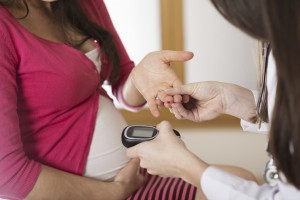Gestational diabetes is a common condition that affects up to 10 percent of pregnant women. We talked to Annelee Boyle, MD, a maternal-fetal medicine specialist at UVA Health System to find out more about it.

What causes gestational diabetes?
We don’t know exactly what causes gestational diabetes, but if you think about it, there are certain hormones that the placenta produces that increase a woman’s glucose levels. That’s because glucose, a type of sugar, is a fuel the fetus needs to grow, so it makes sense, in certain women, their bodies can’t compensate for what is a normal physiological response.
How is gestational diabetes diagnosed?
If we have a suspicion that a woman is at risk in the first trimester, we’ll check with a sugar test at her first visit. At-risk women may be overweight, have a family history of diabetes or have had gestational diabetes in prior pregnancies. We screen everyone at the end of the second trimester, about 24–28 weeks gestation, using a simple glucose tolerance test. That’s where you drink a sugary liquid, fondly described as “the gross orange stuff,” and have your blood drawn an hour later.
The liquid contains 50 grams of glucose. This allows us to see how your body responds to a large influx of sugar. If your blood glucose is high on the screening test, then we get a more detailed glucose tolerance profile. During this diagnostic test, you drink twice as much glucose and, instead of drawing your blood once, we draw four times over three hours.
Why do you test at 24-28 weeks?
We test then because we know we can make a difference in outcomes. Diabetes in pregnancy affects mom, but it also affects the fetus. Babies born to moms who are diabetic are at higher risk of:
- Stillbirth
- Birth defects
- Getting too large, which puts them at higher risk of birth injury
No pregnancy has zero risk, but by controlling blood sugar, the risk for mothers with diabetes is about the same as mothers without diabetes. That’s really our goal: to give babies and mom the best shot.
How do we treat gestational diabetes?
For a lot of women, following a diabetic diet and increasing physical activity, particularly after meals, will control their gestational diabetes. Our fabulous nutritionists can help with meal planning. I encourage my patients to take about a 10-minute walk after each meal. For other women, gestational diabetes is a little more difficult to control. In these cases, oral medication may do the trick. As a last resort, we may have to use insulin, which I try to avoid because people don’t like giving themselves shots, but it may be necessary in some cases. Whether you do the shots, pills or no medication at all, you have to test your blood sugar about four times a day and do what it takes to keep it within the proper range.
Does this mean your pregnancy is considered high risk?
It is higher risk. I don’t like to say high risk because women may feel they have a big sign or target on them, but it does require some special care and attention.
Make An Appointment
Obstetrics:
High-Risk:
Do you need to see a maternal-fetal medicine (MFM) doctor if you have gestational diabetes or can you see your regular obstetrician?
It depends on your regular OB. I know a lot of doctors are very comfortable dealing with diabetes that’s well controlled with diet and exercise or even with oral medication, but if you need insulin, I would recommend seeing a specialist. A woman and her doctor should work this out together. If you do get to the point that you need medication, either with pills or with insulin, we would recommend an ultrasound to make sure the baby is growing properly. That can be done at a high-risk doctor’s office or at your own doctor’s office. You may also need to monitor the baby’s activity through something like a non-stress test or biophysical profile. Those are two different tests, but both look to see if the baby is healthy and active.
Are you more likely to get gestational diabetes with subsequent pregnancies?
You are. Think of pregnancy as a stress test for your body. You’re also eight times more likely to develop type 2 diabetes later in your life if you have gestational diabetes. I tell my patients to look at this as positive. Knowing you’re at increased risk for type 2 diabetes, you can make better choices and changes outside of pregnancy. By placing a high priority on maintaining your weight and staying physically active, you may be able to stave off type 2 diabetes.
What can you do to prevent it?
Try to enter a pregnancy at the peak of health. If you’re at normal weight before pregnancy, you’re less likely to develop gestational diabetes. Also follow a reasonable diet and exercise plan while you’re pregnant. Your baby really only needs an extra 300 calories a day, and you probably don’t need to gain any weight until after the first trimester. Remember: You’re eating for two, but you’re not eating for two linebackers.
When does gestational diabetes go away?
It should go away when we remove the placenta because the placenta is what causes the extra hormones that increase your glucose. But sometimes it doesn’t go away. We want to test everyone with gestational diabetes at six weeks after birth to make sure it’s gone and the patient isn’t really a type 2 diabetic. If you have gestational diabetes, let your primary care doctor know and be tested periodically, usually once a year, to make sure you’re not developing type 2 diabetes outside of pregnancy.
Anything else?
The word diabetes sounds really scary, but you can still have a healthy pregnancy. We’ll work with you to achieve the very best outcome for you and your baby.